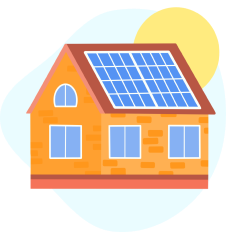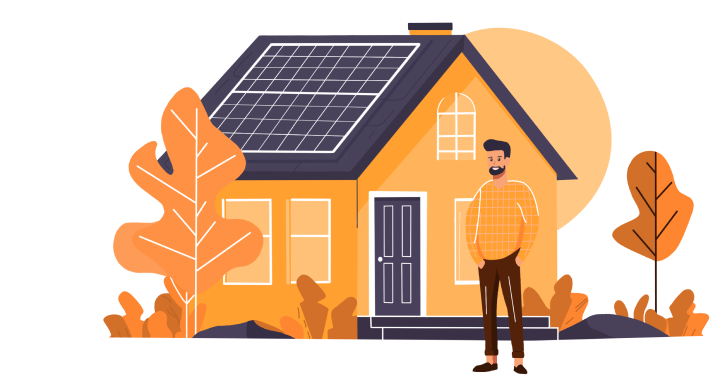Investing in a solar panel install or installation can reduce your energy bills and enhance your home's sustainability. However, understanding the specific factors that affect installation, such as roof condition, local climate, solar panel installation cost and sun exposure, lays the groundwork for a successful setup.
Proper preparation ensures that you not only maximize the efficiency of your panels but also capitalize on the financial benefits of solar power. Solar Energy Host is here to help homeowners navigate the complexities of finding the right installer so they can enjoy the rewards of clean, cost-effective energy.
Read on and find out how you can quickly get quotes from different solar installation companies with our help.
Step #1: Evaluate your home's solar potential.
Assess the sunlight exposure
Start by monitoring how much sunlight hits your property across different seasons. Tools like solar maps or sun calculators can provide insights.
Remember to consider obstructions like trees or nearby buildings that might shade your roof before your "solar panel install." These factors directly influence the effectiveness of your solar panel setup and can guide the placement and type of panels you choose.
Analyze roof condition and orientation
The condition and orientation of your roof make a big difference for your solar panel installation service. Ensure that your roof can physically support the weight of the panels. Older roofs might need reinforcement or replacement before proceeding with a "solar panel install." The orientation of your roof also affects your panels' exposure to the sun.
In some cases, you may have to go for a ground-mounted solar installation instead. Consulting with a professional can help you determine the exact orientation and tilt for maximum solar gain.
Consider local climate factors
Local climate significantly impacts solar panel efficiency. Naturally, sunny areas offer great solar potential. However, overcast regions still benefit from solar technology, thanks to modern panels designed for lower light conditions.
It's important to choose panels that suit your local weather patterns. Additionally, considering seasonal weather changes will help you understand how your panels will perform year-round, ensuring you make the most of your investment.
Step #2: Choose the right solar panels.
Compare types of solar panels
When selecting solar panels, the diversity in types and efficiency is vast, necessitating a thoughtful comparison before committing to a "solar panel install." Monocrystalline panels, known for their high efficiency and sleek design, are ideal for residential roofs where space and aesthetic appeal are considerations.
On the other hand, polycrystalline panels offer a balance between cost and efficiency, making them suitable for those with a tighter budget looking for affordable solar installation in home. Lastly, thin-film panels, although less efficient per square foot, provide unique flexibility and are excellent for non-traditional surfaces or large commercial spaces.
Understand efficiency rates
Efficiency rates from a solar panel install service directly influence your return on investment. Higher efficiency rates mean more power output per square foot for maximizing energy production in limited spaces.
Monocrystalline panels, for example, generally have the highest efficiency rates, making them a premium choice, especially in regions with high sunlight exposure.
Step #3: Obtain necessary permits and approvals.
Building codes and regulations
Research local building codes that apply to solar installations. Every community has its own set of rules, which can impact the placement, size, and type of "solar panel install" allowed. A visit to your local building department's website or a direct consultation can provide you with the specifics of permit requirements and the associated costs.
Apply for permits
Make sure you have all the documentation you need to support your application for solar panel installation permits. You may be required to submit plans, including structural calculations and electrical schematics, to navigate the final approval steps. You can engage a qualified and certified solar installer who is well-versed in the regional regulations through Solar Energy Host.
Frequently Asked Questions (FAQ)
What are the benefits of installing solar panels?
A "solar panel install" service offers several advantages, including reductions in electricity bills and increased property value. They utilize a clean, renewable energy source, reducing reliance on fossil fuels and lowering your carbon footprint. Additionally, solar energy installation improves your energy independence, protecting you from energy price fluctuations and potential outages.
How much money can I save by installing solar panels?
Savings from installing solar panels vary based on local electricity rates, the amount of sunlight in your area and your energy usage. Higher electricity rates and greater personal consumption generally lead to more substantial savings. Solar incentives like tax credits also improve return on investment.
Plus, by finding your provider through Solar Energy Host, you can choose the best offer among several quotes from different solar installation companies.
What happens to excess energy generated by solar panels?
Excess energy management is a key aspect of solar energy systems.
For grid-tied solar panel installation systems, excess electricity can be fed back into the power grid, earning you credits through net metering. This arrangement allows you to offset the cost of power drawn from the utility at night or on cloudy days, potentially reducing your energy bills further or even earning a profit.
For those with an off-grid solar system install, excess energy is stored in batteries for later use. This setup is ideal for ensuring energy availability during outages.
Make the switch
At Solar Energy Host, our goal is to simplify the process of transitioning to solar energy. Discover the substantial savings that solar panels can offer. By entering basic information, you'll receive competitive quotes directly from the top local providers about the cost of installing solar panels.
We ensure that your journey towards sustainable energy is secure, leveraging the latest encryption technology to protect your data. Start saving today and find out just how cost-effective installing solar panels can be with us!




















